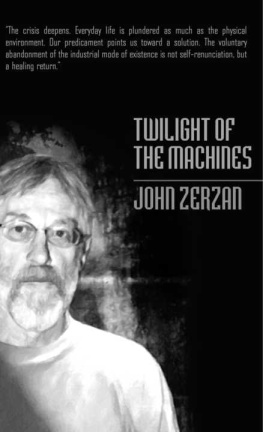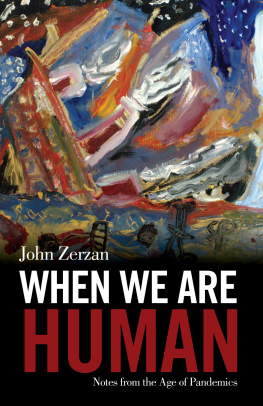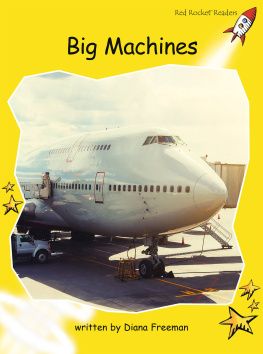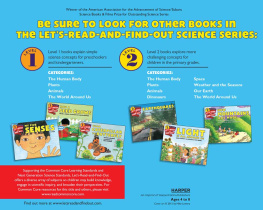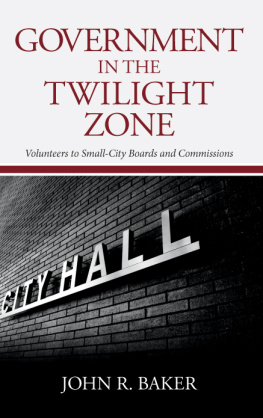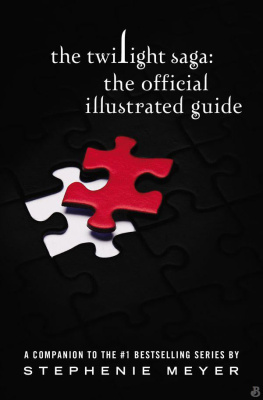John Zerzan - Twilight of the Machines
Here you can read online John Zerzan - Twilight of the Machines full text of the book (entire story) in english for free. Download pdf and epub, get meaning, cover and reviews about this ebook. genre: Religion. Description of the work, (preface) as well as reviews are available. Best literature library LitArk.com created for fans of good reading and offers a wide selection of genres:
Romance novel
Science fiction
Adventure
Detective
Science
History
Home and family
Prose
Art
Politics
Computer
Non-fiction
Religion
Business
Children
Humor
Choose a favorite category and find really read worthwhile books. Enjoy immersion in the world of imagination, feel the emotions of the characters or learn something new for yourself, make an fascinating discovery.
- Book:Twilight of the Machines
- Author:
- Genre:
- Rating:5 / 5
- Favourites:Add to favourites
- Your mark:
- 100
- 1
- 2
- 3
- 4
- 5
Twilight of the Machines: summary, description and annotation
We offer to read an annotation, description, summary or preface (depends on what the author of the book "Twilight of the Machines" wrote himself). If you haven't found the necessary information about the book — write in the comments, we will try to find it.
Twilight of the Machines — read online for free the complete book (whole text) full work
Below is the text of the book, divided by pages. System saving the place of the last page read, allows you to conveniently read the book "Twilight of the Machines" online for free, without having to search again every time where you left off. Put a bookmark, and you can go to the page where you finished reading at any time.
Font size:
Interval:
Bookmark:

THE fflDCHIDCS

JOHN ZRZAR

THE ITIACHIflCS

JOHN ZCRZAfl

Part I: Origins of the Crisis
I Too Marvelous for Words: Language Briefly Revisited
xx Patriarchy, Civilization, and the Origins of Gender
xx On the Origins of War
xx The Iron Grip of Civilization: the Axial Age
xx Alone Together: the City and its Inmates
xx Future Primitive Notes
xx Beyond Symbolic Thought: an interview with Kevin Tucker
Part II: The Crisis of Civilization
xx Twilight of the Machines
xx Exiled from Presence
xx The Modern Anti-World
xx Globalization and Its Apologists: An Abolitionist
xx Perspective
xx Overman and Llnabomber
xx Why Primitivism?
xx Second-Best Life: Real Virtuality
xx Breaking Point?
xx Finding Our Way Back Home
Specialization, domestication, civilization, mass society, modernity, technoculture... behold Progress, its fruition presented more and more unmistakably. The imperative of control unfolds starkly, pushing us to ask questions equal to the mounting threat around us and within us. These dire times may yet reveal invigorating new vistas of thought and action. When everything is at stake, all must be confronted and superseded. At this moment, there is the distinct possibility of doing just that.
People all over the world are showing that they are ready to engage in this dialogue. The challenge is to broach a new conversation in one's own society. The effort begins with a refusal to accept the givens that are turning on us so relentlessly, so viciously. The confrontation is with the increasingly pathological state of modern society: outbursts of mass homicide, an ever more drug-reliant populace, amid a collapsing physical environment. The initiative remains disconnected and marginalized, with enormous inertia and denial in its way. But reality is persistent, and it's calling forth a questioning that is as unprecedented as the darkening situation we face.
Clinging to politics is one way of avoiding the confrontation with the devouring logic of civilization, holding instead with the accepted assumptions and definitions. Leaving it all behind is the opposite: a truly qualitative change, a fundamental paradigm shift. This change is not about:
seeking "alternative" energy sources to power all the projects and systems that should never have been started up in the first place;
being vaguely "post-Left", the disguise that some adopt while changing none of their (leftist) orientations;
espousing an "anti-globalization" orientation that's anything but, given activists' near-universal embrace of the totalizing industrial world system;
preserving the technological order, while ignoring the degradation of millions and the systematic destruction of the earth that undergird the existence of every part of the technoculture;
claiming-as anarchists-to oppose the state, while ignoring the fact that this hypercomplex global setup couldn't function for a day without many levels of government.
The way is open for radical change. If complex society is itself the issue, if class society began with division of labor in the Neolithic, and if the Brave New World now moving forward was born with the shift to domesticated life, then all we've taken for granted is implicated. We are seeing more deeply, and the explorations must extend to include everyone. A daunting, but exciting opportunity!
Twilight of the Machines is offered in this spirit. Part i deals with remote origins and developments within early civilization. Part 2 has a more contemporary focus. May assumptions be questioned, and may conversations proliferate!
-John Zerzan




A few years ago the now-deceased philosopher of science and anarchist Paul Feyerabend was invited to sign a petition being circulated by well-known European thinkers. Its thrust was that society is in need of input from philosophers, who draw upon the "intellectual treasures" of the past. In these dark times, the petition concluded, "We need philosophy."
Derrida, Ricoeur and the other liberal concocters of the document were no doubt shocked by Feyerabend's negative reaction. He pointed out that philosophy's "treasures" were not meant as additions to ways of living, but were intended to express their replacement. "Philosophers," he explained, "have destroyed what they have found, much in the way that the [other] standard-bearers of Western civilization have destroyed indigenous cultures... "' Feyerabend wondered how civilized rationality-which has reduced a natural abundance of life and freedom and thereby devalued human existence-became so dominant. Perhaps its chief weapon is symbolic thought, with its ascendancy in the form of language. Maybe the wrong turn we took as a species can be located at that milestone in our evolution.
"Writing... can be seen to cause a new reality to come into being," according to Terence Hawkes, who adds that language "allows no single, unitary appeals to a 'reality' beyond itself. In the end, it constitutes its own reality."' An infinitely diverse reality is captured by finite language; it subordinates all of nature to its formal system. As Michael Baxandall put it, "Any language... is a conspiracy against experience in the sense of being a collective attempt to simplify and arrange experience into manageable parcels."'
At the beginning of domination and repression, the start of the long process of depleting the riches of the living world, is a very illadvised separation from the flow of life. What was once freely given is now controlled, rationed, distributed. Feyerabend refers to the effort, especially by specialists, to "reduce the abundance that surrounds and confuses them. "4
The essence of language is the symbol. Always a substitution. Always a paler re-presentation of what is at hand, what presents itself directly to us. Susanne Langer pondered the mysterious nature of symbols: "If the word 'plenty' were replaced by a succulent, real, ripe peach, few people could attend to the mere content of the word. The more barren and indifferent the symbol, the greater its semantic power. Peaches are too good to act as words; we're too much interested in peaches themselves." 5
Font size:
Interval:
Bookmark:
Similar books «Twilight of the Machines»
Look at similar books to Twilight of the Machines. We have selected literature similar in name and meaning in the hope of providing readers with more options to find new, interesting, not yet read works.
Discussion, reviews of the book Twilight of the Machines and just readers' own opinions. Leave your comments, write what you think about the work, its meaning or the main characters. Specify what exactly you liked and what you didn't like, and why you think so.

